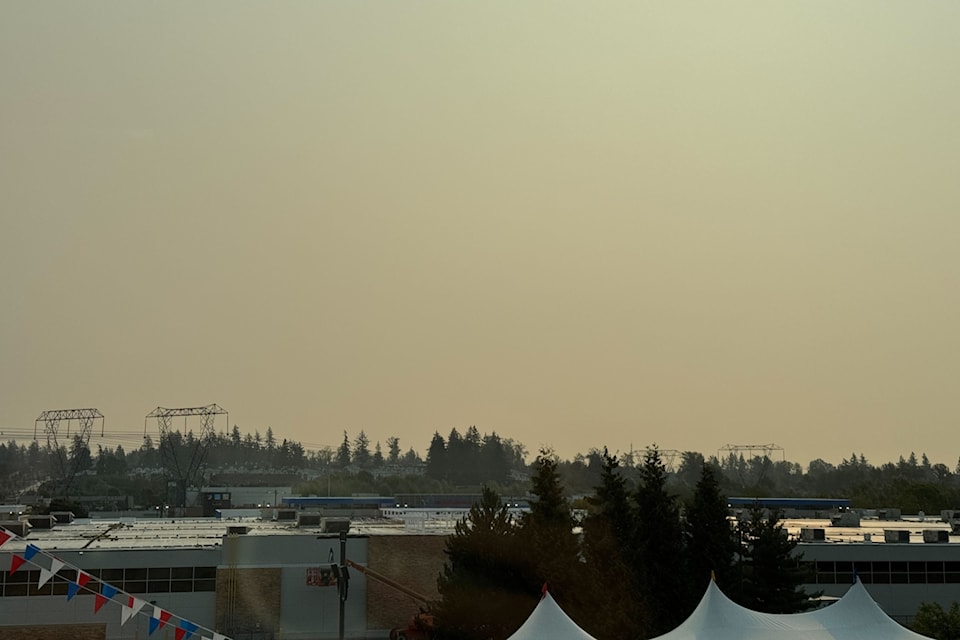Top Stories
Wildfire Smoke Engulfs British Columbia, Health Alerts Issued

Much of British Columbia is currently under a special air quality statement issued by Environment Canada on September 5, 2023, due to several wildfires burning out of control in the southern region. The statement warns that the majority of the province will be affected by wildfire smoke over the next 24 to 48 hours, with conditions expected to fluctuate rapidly across different areas.
As smoke from local wildfires spreads, officials emphasize that air quality can change significantly over short distances and may vary considerably from hour to hour. Residents are encouraged to stay informed about air quality warnings issued by the provincial government.
In a briefing on Wednesday, Ravi Parmar, the Forests Minister, highlighted the anticipated impact of smoke on wildfire response efforts in the coming days. He indicated that more smoke is expected to blanket central and southern regions of the Interior by Wednesday evening or Thursday, with smoky conditions likely reaching coastal British Columbia by Friday. The minister also noted that some of the smoke is originating from wildfires in the Yukon and Northwest Territories.
The health implications of wildfire smoke are a concern, as explained by Sarah Henderson, the scientific director of environmental health services at the B.C. Centre for Disease Control. She stated that the combination of heat and smoke can exacerbate health issues. “Simply put, heat makes wildfire smoke worse, so when those two things happen together, we see a bigger impact than when either of them is happening alone,” Henderson noted.
Smoke exposure can lead to a range of symptoms, from mild irritation to more serious health issues. Common symptoms include sore throats, stinging eyes, headaches, and mild coughs, which typically subside once the smoke dissipates. However, some individuals may experience more severe reactions, such as difficulty breathing or chest tightness. Henderson emphasized that people experiencing these severe symptoms should seek immediate medical attention.
Certain populations are more susceptible to the effects of air pollution. Individuals aged 65 and older, pregnant individuals, infants and young children, those with pre-existing health conditions, and outdoor workers should take precautions. They are advised to limit strenuous outdoor activities and to seek medical assistance if they experience symptoms.
To mitigate the effects of poor air quality, residents are encouraged to keep windows and doors closed as much as possible. During extreme heat events, maintaining a cool indoor environment should be prioritized.
As the wildfire situation develops, monitoring updates from officials will be crucial for public safety in British Columbia.
-

 Education3 months ago
Education3 months agoBrandon University’s Failed $5 Million Project Sparks Oversight Review
-

 Science4 months ago
Science4 months agoMicrosoft Confirms U.S. Law Overrules Canadian Data Sovereignty
-

 Lifestyle3 months ago
Lifestyle3 months agoWinnipeg Celebrates Culinary Creativity During Le Burger Week 2025
-

 Health4 months ago
Health4 months agoMontreal’s Groupe Marcelle Leads Canadian Cosmetic Industry Growth
-

 Science4 months ago
Science4 months agoTech Innovator Amandipp Singh Transforms Hiring for Disabled
-

 Technology4 months ago
Technology4 months agoDragon Ball: Sparking! Zero Launching on Switch and Switch 2 This November
-

 Education4 months ago
Education4 months agoRed River College Launches New Programs to Address Industry Needs
-

 Technology4 months ago
Technology4 months agoGoogle Pixel 10 Pro Fold Specs Unveiled Ahead of Launch
-

 Business3 months ago
Business3 months agoRocket Lab Reports Strong Q2 2025 Revenue Growth and Future Plans
-

 Technology2 months ago
Technology2 months agoDiscord Faces Serious Security Breach Affecting Millions
-

 Education4 months ago
Education4 months agoAlberta Teachers’ Strike: Potential Impacts on Students and Families
-

 Education4 months ago
Education4 months agoNew SĆIȺNEW̱ SṮEȽIṮḴEȽ Elementary Opens in Langford for 2025/2026 Year
-

 Science4 months ago
Science4 months agoChina’s Wukong Spacesuit Sets New Standard for AI in Space
-

 Business4 months ago
Business4 months agoBNA Brewing to Open New Bowling Alley in Downtown Penticton
-

 Business4 months ago
Business4 months agoNew Estimates Reveal ChatGPT-5 Energy Use Could Soar
-

 Technology4 months ago
Technology4 months agoWorld of Warcraft Players Buzz Over 19-Quest Bee Challenge
-

 Business4 months ago
Business4 months agoDawson City Residents Rally Around Buy Canadian Movement
-

 Technology2 months ago
Technology2 months agoHuawei MatePad 12X Redefines Tablet Experience for Professionals
-

 Technology4 months ago
Technology4 months agoFuture Entertainment Launches DDoD with Gameplay Trailer Showcase
-

 Top Stories3 months ago
Top Stories3 months agoBlue Jays Shift José Berríos to Bullpen Ahead of Playoffs
-

 Technology4 months ago
Technology4 months agoGlobal Launch of Ragnarok M: Classic Set for September 3, 2025
-

 Technology4 months ago
Technology4 months agoInnovative 140W GaN Travel Adapter Combines Power and Convenience
-

 Science4 months ago
Science4 months agoXi Labs Innovates with New AI Operating System Set for 2025 Launch
-

 Technology4 months ago
Technology4 months agoNew IDR01 Smart Ring Offers Advanced Sports Tracking for $169










